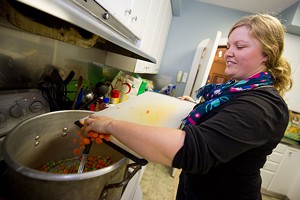Published November 3, 2010 at 6:13 a.m.
The women of Delta Delta Delta know they’re spoiled. Five nights a week, Dan Siegel comes to their house to feed them. His dinners don’t arrive in a box, and they’re definitely not zapped in a microwave.
Siegel cooks everything from chicken piccata and cacciatore — the women are chicken fanatics, he says — to authentic matar paneer and South Indian chicken curry made with a spice mix he blends and toasts himself. Siegel does this all without recipes — he doesn’t need them. He’s been cooking since he was 7 years old.
The sorority sisters, all students at the University of Vermont, appreciate their feasts. Without Siegel, the 17 women who live in the North Willard Street house would have to fend for themselves, trawling the dining hall or cobbling dinner together on their own. Neither option comes close to trumping Siegel’s productions.
“It’s pretty great,” says 20-year-old junior Marissa Ploof, the chapter’s house manager, about Siegel’s cooking. “I love it.”
Siegel, 31, has been cooking for the Tri Delts for seven years. He’s one of six cooks who work in UVM’s fraternity and sorority houses. Thanks to annual dues that pay Siegel’s and the other cooks’ wages, the university’s Greek students who live in the chapter houses have personal chefs preparing made-to-order dishes, sometimes twice a day.
Because of the unusual work conditions and relatively high wages — $20 to $32 an hour, depending on the house — the Greek cooking jobs have attracted a motley group of people, ranging from artists to former restaurant owners. Some are trying to fine-tune the students’ palates, while others have resigned themselves to serving up reliable crowd pleasers.
Eating meals together helps the chapter members bond, says Kimberlee Monteaux, UVM’s Greek Life advisor. How are they going to throw wicked raging keggers if they’re not all buddies?
A potter by trade, Siegel found out about the job through the Tri Delts’ then-housemother, also a potter. At the time, he was working at O Bread Bakery at Shelburne Farms and doubted he could swing another job.
But he couldn’t resist the hours and wages the sorority offered — he’s paid $200 a week to cook five meals, which usually takes 10 hours, if that. That’s about double the hourly wage of a line cook in Burlington. Siegel realized the job would allow him to quit his baking gig and “try to make it as an artist.”
So far, it’s worked. Siegel says his quirky ceramics line, Danmade, which features robots, ninjas and crying babies, has flourished thanks to his new schedule.
“It’s so low stress as far as cooking jobs go,” Siegel says of the sorority job. “I know how much to make, what ingredients I have available, and I don’t have to deal with angry customers.”
Like Siegel, Moe O’Hara is an artist who took advantage of the low stress, minimal hours and good pay of cooking at a sorority. The 30-year-old has been the cook at the Pi Beta Phi chapter house on South Prospect Street for the past year and a half. Working fewer than 12 hours a week affords O’Hara the time to focus her energies on her craft business Recycle Moe. Plus, she makes money doing something that’s second nature to her.
One of seven children, O’Hara used to take her turn in the kitchen helping her mother out, she recalls. As a result, she learned to cook basic comfort food for large groups, a skill that serves her well at Pi Beta Phi.
Over the years, O’Hara has worked in a bakery and cooked for migrant workers as an AmeriCorps volunteer. Preparing food for 16 women (65 on Sunday for chapter meetings) is no big deal.
On a recent Monday night, O’Hara whips up tomato soup to go with the grilled cheese on the menu that day. Like Siegel, she doesn’t need recipes.
With fresh celery, carrots, onions and garlic, O’Hara makes a soup base. As that simmers on a regular home range (most of the fraternity and sorority houses have commercial ranges and ovens), O’Hara slices bread for the grilled cheese sandwiches.
Whenever possible, she incorporates local ingredients into her menus. Unlike Siegel, O’Hara shops for her meals and can buy what she likes within the $75-per-meal budget. For this dinner, she uses cheese from Cabot and multigrain bread from La Panciata in Northfield.
After the soup base is finished, O’Hara adds huge cans of plump tomatoes, spoonfuls of vegetable paste base and a few dashes of Worcestershire sauce. As she works, sorority sisters shuffle around the kitchen in slippers, nibbling on Halloween candy and kvetching about the kitchen’s broken faucet.
One, Coco Gruet, a 19-year-old sophomore, coos about O’Hara’s cooking.
“Ahhh ... it’s unbelievable,” she says. “Her mac ’n’ cheese, I think it’s world famous. It’s homemade with love and has potato chips on top. It’s just great.”
Most of O’Hara’s meals are homestyle comfort food made with fresh ingredients — tacos, stir fries, pizzas with crusts from Junior’s. Salad-bar night is a particular hit with the Pi Phis. O’Hara consults with the women on what they like to eat and does her best to accommodate.
“I just try to appeal to the masses,” she says.
Tony DiRuocco, who cooks for the fraternity Alpha Gamma Rho, is definitely not trying to appeal to the masses. If he did, he probably wouldn’t be serving the brothers pork saltimbocca or homemade squash ravioli. What DiRuocco is trying to do is educate the men about how food, particularly real food cooked with passion, tastes.
When DiRuocco, a native of the Italian island of Capri, applied for the job at AGR, the brothers thought he was nuts, says Christian Ruf, a 22-year-old senior. Why would someone who’d owned his own restaurant for more than 20 years — Villa Tragara in Waterbury, now Michael’s on the Hill — want to cook in some filthy frat house?
The AGR job appealed to DiRuocco because, he says, he’d already achieved his dream of opening and running a restaurant, but he still wanted to cook. After he sold his business in 2002, DiRuocco returned to Capri for six months a year to help his brother with his own restaurant. He kept this up until 2009, when he decided he wanted to work closer to home. He was over the grind of daily restaurant work, he says, but cooking was his life. He didn’t want to stop.
Thinking the application was a joke, the AGR brothers initially ignored DiRuocco’s résumé and hired someone else. But, when that cook didn’t work out, the brothers posted the job again, and again DiRuocco applied. When the men brought him in for an interview, he treated them to a limoncello tart and a torta di Capri — a flourless chocolate and almond tart. They were sold.
It’s somewhat shocking to hear the words “haricots verts,” “pancetta” and “profiteroles” uttered in an environment where most college-aged males are happily pounding Sloppy Joes and slurping Jell-O pudding cups without a spoon. But DiRuocco, 64, says he’s giving his “guys” an education.
For a recent weekday lunch, he prepares a salad with dried cranberries, walnuts, feta and a homemade maple-mustard sauce; a broccoli, chicken and Tuscan couscous soup; and pork loin and marinara sandwiches on bread rolls he made earlier in the day. Later in the week, the brothers will be treated to homemade fettuccine with shrimp and pumpkin, lasagna, and chicken tortellini soup.
Open the industrial refrigerator at AGR, and you may get a surprise. Dangling above the family-size bottles of Hershey’s syrup and Heinz ketchup are two pork bellies, which will become pancetta when they’ve finished curing. DiRuocco makes his own prosciutto, as well.
Most of the guys in the house, like Ruf, didn’t have a clue where pancetta came from before DiRuocco. Now, their culinary expectations are through the roof.
“[Tony] gives an excellent standard of what to look for in food,” Ruf says. “Most times now, if I go out to eat in Burlington, I’m disappointed.”
“I enjoy to teach what is the good food,” DiRuocco says, his Italian accent still thick after more than 30 years in this country.
While DiRuocco’s diners are willing to experiment with new dishes, not all the Greek kids are as flexible. One fraternity cook, who asked that he not be named, says when he tried to cook lentils for the brothers, 75 percent of them ended up in the garbage. Same happened when he made squash last week. His clients are meat-and-potato guys, he says, slapping fistfuls of hamburger meat into submissive little loaves.
“I learned I didn’t need to go crazy and put labor-intensive food out,” the cook says, as he prepares a green-bean casserole using a recipe from the back of a Betty Crocker box. “There’s only so many vegetables these guys will eat. They’re not the most adventurous eaters.”
More By This Author
Speaking of...
-

Senate Education Committee Advances Literacy Bill
Mar 15, 2024 -

Time to Vote! It's Town Meeting Day 2024
Mar 5, 2024 -

Teachers' Union Raises 'Significant Concerns' About Dyslexia Screening Bill
Feb 2, 2024 -

Records Show UVM Professors Questioned Decision to Nix Palestinian Writer’s Appearance
Dec 20, 2023 -

Q&A: Howard Fisher Delivers Meals on Wheels With a Side of Good Cheer
Dec 20, 2023 - More »
Comments
Showing 1-1 of 1
Comments are closed.
From 2014-2020, Seven Days allowed readers to comment on all stories posted on our website. While we've appreciated the suggestions and insights, right now Seven Days is prioritizing our core mission — producing high-quality, responsible local journalism — over moderating online debates between readers.
To criticize, correct or praise our reporting, please send us a letter to the editor or send us a tip. We’ll check it out and report the results.
Online comments may return when we have better tech tools for managing them. Thanks for reading.
















































